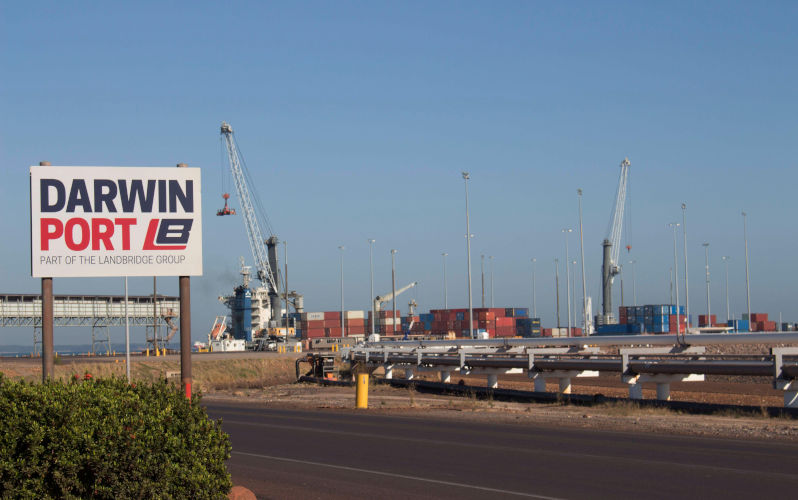Move to revoke Darwin port lease is a political decision
June 4, 2025
Moves to force divestiture of the port of Darwin damage Australia’s standing as a reliable investment destination and represents a triumph of foreign influence on policy.
The move to revoke the lease on the Australian port of Darwin opens a pandora’s box of Third World-style sovereign investment risk.
As the result of an open-tender process, the northern-most Australian port was leased in 2015 to Chinese logistics company, Landbridge.
Almost immediately, it was claimed the port was of strategic importance and there should not be any Chinese involvement. These claims were despite decades of neglect from the national government which refused to provide support funding for port upgrades and improvements.
The proposed forced divestment through an unwelcome buyout takes a step into the Third World where political decisions are used to override commercial agreements and long-term investment decisions.
Australia’s claim to have stabilised the Australia-China relationship hides the increasing opposition to Chinese-related investment and the increasing pressure to negate commercial agreements.
These moves started under the cover of COVID with extra Foreign Investment Review Board conditions, including a specific security focus. Although this was denied as being mainly directed at China, the focus became well entrenched in practice.
Speaking off-the-record because of fears of more obstruction, business organisations complain that the much-vaunted even-handed approach is tilted towards disproportional scrutiny of investment proposals which include Chinese interests.
The incline of this slippery slope accelerated with the forced disinvestment of Chinese interests in Northern Minerals. Five shareholder companies were linked to the Chinese Yuxiao Fund.
The divestiture straddled a line between charges of commercial chicanery that are the responsibility of the company regulator, the Australian Security and Investments Commission, and a political decision taken by Treasurer Jim Chalmers. It was the writing on the wall foreshadowing an increase in political interference in commercial agreements.
The opposition to the lease of the Darwin port has been a 10-year campaign, led most vocally by the Australian Strategic Policy Institute. This is an organisation that is registered as an agency of foreign influence. It is heavily funded by US, UK and foreign arms companies, and elements of the US, British and Japanese Governments.
For political and ideological purposes, the local parliamentary member also opposed the lease of the port. Like ASPI, he claimed that Landbridge owner, Ye Cheng was associated with high-level political leaders in China. This apparently was an issue of concern.
Business leaders associating with government is not unique to China. Industry leaders in the US make no secret of their desire to befriend President Trump.
The suggestion that US-based private equity giant Cerberus Capital Management is an interested buyer of the Darwin port lease fails to note that its co-founder, billionaire Steve Feinberg, stepped aside from his role as the company’s chief executive earlier this year to become the deputy secretary of Defence in the Trump White House.
The nature of this prolonged opposition to the Darwin port lease is significant because it flies in the face of three national government-commissioned reports, all of which concluded the port lease poses no security risk to Australia.
The rejection of these reports by opponents points clearly to an ideological position, rather than opposition based on independently verified facts. As China’s ambassador to Australia noted, the core issue is the reliability of commercial agreements. He called on the Northern Territory and federal governments to “honour its binding commitments” under the contract.
“It is ethically questionable to lease the port when it was unprofitable and then seek to reclaim it once it becomes profitable,” he said.
The rejection of factual analysis and commercial obligations in favour of political considerations is a characteristic usually associated with high levels of sovereign risk in less developed countries.
Although there is no suggestion yet, there may be some unease around the stability of long-term contracts struck in 2002 for the export of offshore gas to China. The recent national election saw calls for gas companies to break long-term overseas supply agreements. Senior managers from Japan’s Inpex facility in Darwin raised their concerns about honouring commercial obligations.
The Darwin port response suggests China is more vulnerable to these political demands.
Despite Landbridge saying the port is not for sale, the pressure for a forced sale and divesture is growing. If it is successful, it reduces the investment environment in Australia to that of a Third World country where the rule of law is subject to political whims. It dramatically increases the level of sovereign risk, particularly for any investment that has a Chinese component.
Even if the push for divestiture or forced lease buyout is unsuccessful, the damage done to Australia’s reputation as an advanced investment destination is significant. Investors will ask why they should contemplate entering into long-term investment agreements at national or sub-national level when there is the potential for such commercial agreements to be overturned for political reasons.
Forced divestiture of the Darwin port lease threatens to make Australian a port of no return for investors.
The views expressed in this article may or may not reflect those of Pearls and Irritations.

